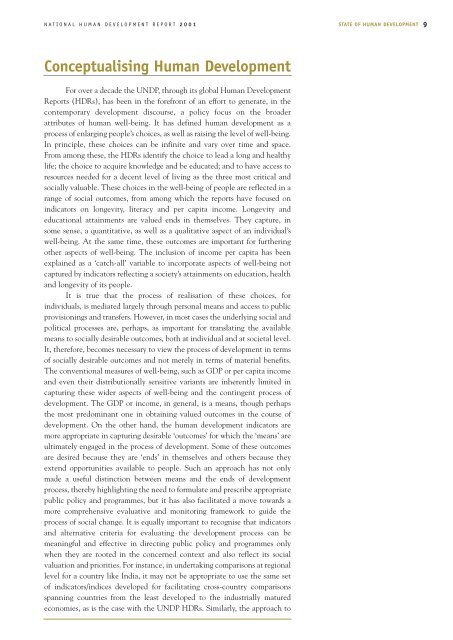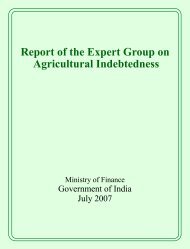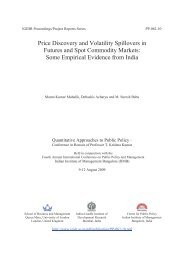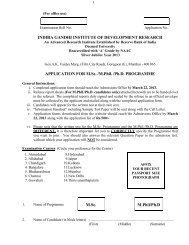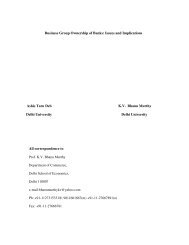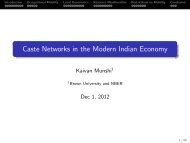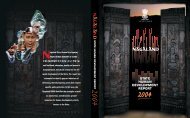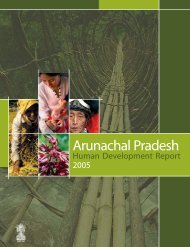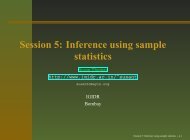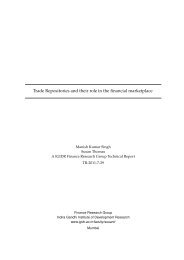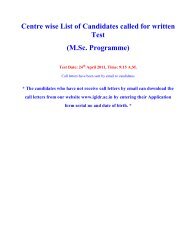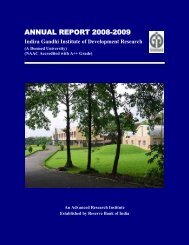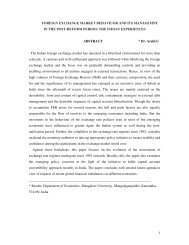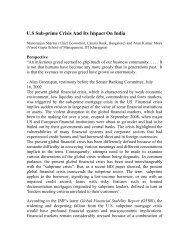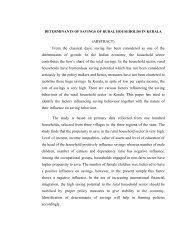National Human Development Report: 2001 - Indira Gandhi Institute ...
National Human Development Report: 2001 - Indira Gandhi Institute ...
National Human Development Report: 2001 - Indira Gandhi Institute ...
- No tags were found...
Create successful ePaper yourself
Turn your PDF publications into a flip-book with our unique Google optimized e-Paper software.
NATIONAL HUMAN DEVELOPMENT REPORT <strong>2001</strong> STATE OF HUMAN DEVELOPMENT 9Conceptualising <strong>Human</strong> <strong>Development</strong>For over a decade the UNDP, through its global <strong>Human</strong> <strong>Development</strong><strong>Report</strong>s (HDRs), has been in the forefront of an effort to generate, in thecontemporary development discourse, a policy focus on the broaderattributes of human well-being. It has defined human development as aprocess of enlarging people’s choices, as well as raising the level of well-being.In principle, these choices can be infinite and vary over time and space.From among these, the HDRs identify the choice to lead a long and healthylife; the choice to acquire knowledge and be educated; and to have access toresources needed for a decent level of living as the three most critical andsocially valuable. These choices in the well-being of people are reflected in arange of social outcomes, from among which the reports have focused onindicators on longevity, literacy and per capita income. Longevity andeducational attainments are valued ends in themselves. They capture, insome sense, a quantitative, as well as a qualitative aspect of an individual’swell-being. At the same time, these outcomes are important for furtheringother aspects of well-being. The inclusion of income per capita has beenexplained as a ‘catch-all’ variable to incorporate aspects of well-being notcaptured by indicators reflecting a society’s attainments on education, healthand longevity of its people.It is true that the process of realisation of these choices, forindividuals, is mediated largely through personal means and access to publicprovisionings and transfers. However, in most cases the underlying social andpolitical processes are, perhaps, as important for translating the availablemeans to socially desirable outcomes, both at individual and at societal level.It, therefore, becomes necessary to view the process of development in termsof socially desirable outcomes and not merely in terms of material benefits.The conventional measures of well-being, such as GDP or per capita incomeand even their distributionally sensitive variants are inherently limited incapturing these wider aspects of well-being and the contingent process ofdevelopment. The GDP or income, in general, is a means, though perhapsthe most predominant one in obtaining valued outcomes in the course ofdevelopment. On the other hand, the human development indicators aremore appropriate in capturing desirable ‘outcomes’ for which the ‘means’ areultimately engaged in the process of development. Some of these outcomesare desired because they are ‘ends’ in themselves and others because theyextend opportunities available to people. Such an approach has not onlymade a useful distinction between means and the ends of developmentprocess, thereby highlighting the need to formulate and prescribe appropriatepublic policy and programmes, but it has also facilitated a move towards amore comprehensive evaluative and monitoring framework to guide theprocess of social change. It is equally important to recognise that indicatorsand alternative criteria for evaluating the development process can bemeaningful and effective in directing public policy and programmes onlywhen they are rooted in the concerned context and also reflect its socialvaluation and priorities. For instance, in undertaking comparisons at regionallevel for a country like India, it may not be appropriate to use the same setof indicators/indices developed for facilitating cross-country comparisonsspanning countries from the least developed to the industrially maturedeconomies, as is the case with the UNDP HDRs. Similarly, the approach to


